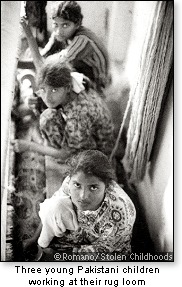Human Trafficking: A Trans-National Criminal Enterprise
Trafficking of humans for slavery is a trans-national criminal enterprise that typically is found in regions plagued by poverty, instability of government, and corruption of law enforcement. Crime lords and gangs lure vulnerable men, women, and children with promises of work and education to other lands, only to funnel huge profits into the coffers of organized criminals.
Human trafficking and slavery flourish in the form of sex slavery, domestic servitude, forced debt bondage, involuntary servitude, combatant slaves, child sex tourism, child sports slaves, contract slavery, and cheap child labor.
Of course, not all slaves are trafficked, and not all smuggled persons end up as slaves. Let us discuss the difference between the two.
 Difference between smuggling and trafficking of humans
Difference between smuggling and trafficking of humans
Human smuggling is the facilitation, transportation, or illegal entry of a person across an international border, in violation of one or more countries' laws, either clandestinely or through deception, such as the use of fraudulent documents. Human smuggling is generally done with the consent of the person being smuggled who often pays large sums of money. Once inside the country of their final destination, smuggled persons will generally be left to their own devices. The vast majority of people who are assisted in illegally entering the United States are smuggled, rather than trafficked. However, a person being smuggled may then become a victim of human trafficking as the person is defrauded along the way and forced into labor he or she cannot control.
Trafficking in persons (TIP) can be compared to a modern-day form of slavery. It involves the illegal trade and exploitation of people forced into labor through coercion, fraud, sale, threat, or deception, and includes human rights abuses such as debt bondage, deprivation of liberty, and lack of control over freedom. Trafficking need not involve the actual movement of the victim, and there is no requirement that the victims must cross an international border.
Was Sonia smuggled or trafficked? Answer: Sonia was smuggled into the United States. She left willingly with full knowledge that she was entering the United States illegally. Upon arriving in the United States, Sonia was kept in isolation, was given a place to sleep in a basement, and told not to speak to anyone or she would be turned over to the Immigration Service. Sonia was never paid for her work and felt that she had no one to turn to for help. (Source: U.S. Dept. of State TIP Report 2005)
Once the girls arrive in the U.S., their aunt and uncle immediately tell them that they will not be attending school. The aunt and uncle never intended to have the girls attend school and only enrolled them for the purpose of fraudulently obtaining the entry visas. At this point, the girls have unwittingly been smuggled into the U.S. using visa fraud.
During the next several weeks, the girls are locked in a basement and continually told that if they try to leave, they would be arrested for their involvement in the visa fraud. Eventually, their uncle takes the girls to local motels where they are made to clean rooms and provide janitorial services. The girls are never paid for their work, all their identification has been taken away, and they are continually reminded that they could be arrested for their involvement in visa fraud. Because the girls are being held against their will through coercion and intimidation and are being forced to work for no pay, they are now victims of trafficking. (Source: U.S. Dept. of State TIP Report 2005)
A condensed version was published in the February and April 2006 issue of Catholic World Report.
Read all 16 columns on the subject of Trafficking of Human Slaves by Barbara Kralis at "21st Century Slavery," "Modern Day Slavery Flourishes," "Different Forms of Human Slavery," "Child Sex Tourism," "Slavery as Domestic Servitude," "Combatant Human Slaves," "Involuntary Human Servitude," "Child Slaves for Sport," "Trafficking
Barbara Kralis, the article's author, writes for various Christian and conservative publications. Her columns have been featured at RenewAmerica.us, Catholic World Report, Alliance Defense Fund, Intellectual Conservative, Life Issues, Catholic Culture, The Wanderer newspaper, Phil Brennan's WOW, ChronWatch, North Carolina Conservative, MichNews, Catholic Citizens, Illinois Family Institute, Illinois Leader, New Oxford Review, Seattle Catholic, Faithful Voice, NewsBull, and others. She and her husband, Mitch, live in the great State of Texas, and co-direct the Jesus Through Mary Catholic Foundation. She can be reached at: [email protected].
© 2006 Barbara Kralis
This item 7101 digitally provided courtesy of CatholicCulture.org







